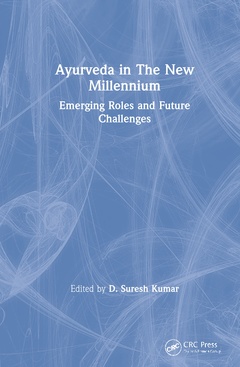Ayurveda in The New Millennium Emerging Roles and Future Challenges
Coordonnateur : Kumar D. Suresh

Ayurveda or "the sacred knowledge of longevity" has been practiced in India and many Asian countries since time immemorial. Interest in Ayurveda started growing all over the world in the late 1970s, following the Alma Ata Declaration adopted by the W.H.O. in 1978. Ayurveda in the New Millennium: Emerging Roles and Future Challenges attempts to survey the progress made in this field and to formulate a course of action to take Ayurveda through the new millennium. It also identifies the many stumbling blocks that need to be removed if Ayurveda is to cater to the needs of a wider audience.
Features:
- Newer insights into the history of Ayurveda
- Regulatory aspects of the manufacture of ayurvedic medicines
- Industrial production of traditional ayurvedic medicines
- Quality control
- The scientific rationale of single herb therapy
- Biological effects of ayurvedic formulations
- Optimization of ancient wisdom and newer knowledge
- Conservation of threatened herbs
- Nutraceuticals and cosmeceuticals from Ayurveda
- Critical view of Ayurveda in the West
- Direction for the Ayurveda renaissance
Ayurveda in the New Millennium: Emerging Roles and Future Challenges describes the strength of Ayurveda and how to usher in the Ayurveda renaissance. This book will be of interest to proponents of Ayurveda and all branches of traditional and alternative medicine. Experts from the fields of medicine, pharmacology, new drug discovery and food technology will also find it useful.
Preface. About the Editor. Contributors. Chapter 1 What We Learn from the History of Ayurveda. Chapter 2 Manufacture of Ayurvedic Medicines – Regulatory Aspects. Chapter 3 Industrial Manufacture of Traditional Ayurvedic Medicines. Chapter 4 Quality Control of Ayurvedic Medicines. Chapter 5 Scientific Rationale for the Use of Single Herb Remedies in Ayurveda. Chapter 6 Biological Effects of Ayurvedic Formulations. Chapter 7 Evidence Building in Ayurveda: Generating the New and Optimizing the Old Could Be Strategic. Chapter 8 Conservation – A Strategy to Overcome Shortages of Ayurveda Herbs. Chapter 9 Lessons to Be Learnt from Ayurveda: Nutraceuticals and Cosmeceuticals from Ayurveda Herbs. Chapter 10 Ayurveda in the West. Chapter 11 Ayurveda Renaissance – Quo Vadis? Index.
D. Suresh Kumar was born on September 21, 1949, in the southern Indian province of Kerala, where he received his early education. He obtained a BSc degree in zoology from the University of Kerala (1969) and secured MSc (1972) and PhD degrees (1977) from Banaras Hindu University, Varanasi. His doctoral thesis was on the hormonal control of oxidative metabolism in reptiles. Thereafter, he spent two years as a postdoctoral fellow in the Department of Biological Sciences, University of Aston in Birmingham, England, investigating the pancreatic physiology of the rainbow trout. He returned to India in 1980 and joined the Department of Zoology, University of Calicut, Kerala, as pool officer in the scientist pool of the Council of Scientific and Industrial Research, New Delhi. During his stay there, a chance encounter with some religious persons introduced him to the study of Ayurveda, the traditional medical system of India. He undertook a survey of the state of Ayurveda in the province and published his findings in provincial and national weeklies. In 1986, he joined the International Institute of Ayurveda, Coimbatore, as a research officer in the Department of Physiology. From 1986 to 2003, he carried out research on various aspects of Ayurveda. In collaboration with Dr. Y.S. Prabhakar, presently at CDRI Lucknow, he proposed the first mathematical model for the ayurvedic concept of tridōṣa in the disease state. He also offered a novel definition for the ayurvedic class of medicine arka, based on his study of the Sanskrit text Arkaprakāśa. In 2003, he joined Sami Labs Ltd., Bangalore, as senior scientist in the R&D laboratory. He spent several years in the company working on various aspects of new product development. From 2012 to 2016 he worked as head of R&D laboratory of the Ayurveda consortium, Confederation for Ayurveda Renaissance Keralam Ltd., Koratty, Kerala. In January, 2016 he joined Cymbio Pharma Pvt Ltd, Bangal
Date de parution : 11-2020
17.8x25.4 cm
Thèmes d’Ayurveda in The New Millennium :
Mots-clés :
High Altitude Pulmonary Edema; Tamil Nadu; Ayurvedic medicines; Caraka Samhita; quality control; Ayurveda history; Recurrent Aphthous Ulcers; Ayurveda renaissance; Evolvulus Alsinoides; single herb therapy; Pterocarpus Marsupium; Nuclear Magnetic Resonance; Young Men; Saraca Asoca; Emblica Officinalis; Cuminum Cyminum; Ayurvedic Pharmacopoeia; Barleria Prionitis; Convolvulus Pluricaulis; Tinospora Cordifolia; Ayurvedic Drugs; Medicinal Plant Species; Medical University System; Situ Conservation; Flax Seeds; Chromatographic Fingerprint; Anonymous 2014b; Macrophage Inflammatory Protein-1 Alpha; Ayurvedic Formulations



